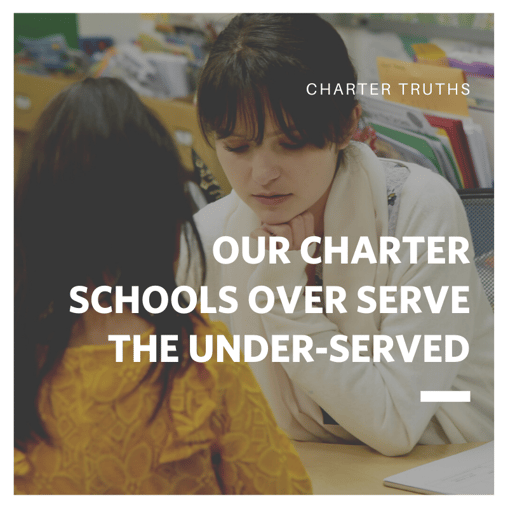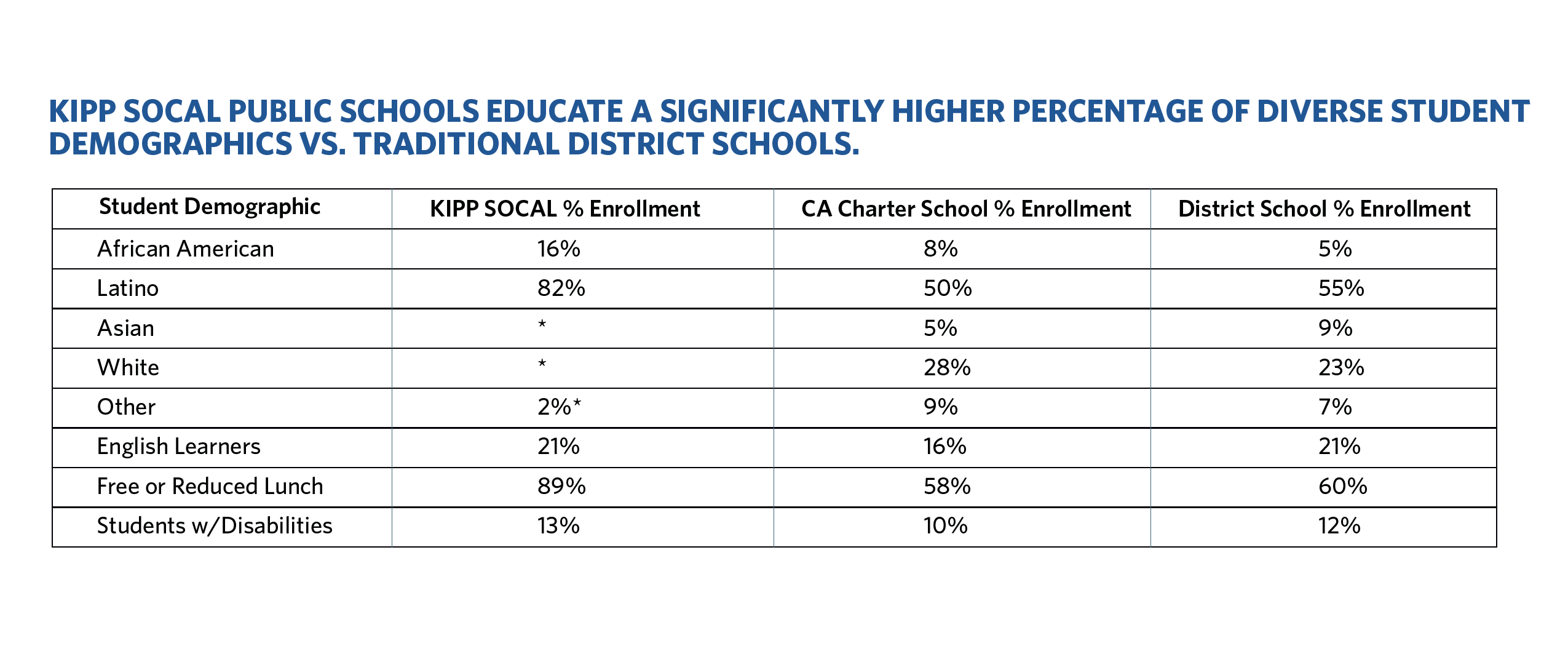
This series will seek to tell the other side of the charter public school story in a way that will bring context to what we believe are truths about charter public schools in general, and specifically about high performing networks, like our own KIPP SoCal. In doing so, we hope you join us in refocusing the narrative on what truly matters: a great public school education for all of our children, regardless of zip code, income, language, or ability.
One of the most pervasive and frequent misconceptions we hear about charter schools is that their performance is tied to "skimming off the top," "cherry-picking' or "pushing students with special needs out." While we can't speak for every charter organization, at KIPP SoCal, the opposite is true. We are completely open in our enrollment. That means that we have no idea what needs or abilities our children have until they are enrolled. Once enrolled, we receive records and revise our programming to meet the needs of our students.
In fact, KIPP SoCal public schools serve a higher percentage of special needs students than either the California state or district schools:

What is unique about Special Education at KIPP SoCal?
The vision of the Mental Health & Support Services department at KIPP SoCal is to holistically nurture the social, emotional and educational development of all scholars by promoting equitable spaces and applying evidence-based, trauma-informed strategies. In collaboration with our families, communities, and team members, we facilitate and coordinate culturally responsive interventions to ensure that all scholars are prepared to access the knowledge and skills necessary to thrive as they climb to, through and beyond.
Our 28 special education counselors across the region work with many stakeholders daily: special education teachers, general education teachers, leadership team members, families, students, community members, related service providers. The magic that allows us to fulfill the promise of special education happens when all members of a child's community work in collaboration. The shared ownership of the well-being for all of our students with special needs is what defines the experience here at KIPPSoCal.
What is distinctive about KIPP SoCal's HEART approach within our Special Education Program?
In our country, 1 out of 4 children will experience at least one traumatic event by the age of 18 (1). In Los Angeles, that number is estimated to be closer to 2 out of 4 children (2). A traumatic event for a child can be anything from the death of a loved one or a house fire to abuse or domestic violence because experts say that trauma is not about the event itself, but rather the experience, response and feelings after the traumatic event(s) (3).
Without early intervention, traumatic experiences in childhood can lead to significant challenges with emotional regulation, impulse control, anxiety, depression, social skills and academic performance (3). Schools can play a significant role to support the prevention of and healing from traumatic events and it starts with nurturing resilience, building relationships and creating safe spaces!
Our HEART (Healing Environments And Responses to Trauma) approach teaches educators to understand the impact that stress and trauma can have on a child’s ability to regulate their emotions, behavior, and ultimately learn. The goal of HEART is to implement trauma-sensitive, research-based practices that are resilience-focused, and culturally sensitive in order to prevent the negative effects of chronic stress and trauma.
There are 6 components to KIPP SoCal HEART:
- Establish school-wide understanding of trauma & resilience. KIPP SoCal educators are provided with training to understand trauma and its impact on student learning and behavior because with the right tools, any person, regardless of their role in our school can help students thrive. Educators are encouraged to be curious about the behaviors that they are seeing and fostering resilience.
- Foster supportive adult relationships. A key ingredient to resilience and overcoming trauma is having one stable and consistent relationship with a caring adult. Our educators understand that relationships require trust, authenticity and time to get to know the whole child and their individual needs.
- Prioritize social and emotional learning. We understand that behavior is a communication tool for children and that teaching social skills, emotional awareness, self-regulation, conflict resolution, and decision making are just as important as academics. The goal is to equip our KIPPsters with coping strategies for future and current challenging feelings (big and small) and stressful or traumatic events.
- Provide physical and emotional safety. Safety is of the utmost importance to us. Beyond the physical safety of our buildings, we strive to create learning environments that are emotionally safe where children have structure, are able to take risks, and feel supported and nurtured by the adults around them.
- Collaborate with families & community. The home-school connection is critical to HEARTS, student engagement, and academic performance. We empower our families to be actively involved in our schools through their child’s education, volunteering, and identifying new ways to connect and collaborate with parents, caregivers and community partners.
- Support & invest in developing educators and quality teaching. We believe in encouraging our team members to practice self-care and investing in their professional development to ensure they have the tools and preparation they need to be the best educators they can be for our KIPPsters.
If we stay focused on what is best for our children, we know that there is nothing good or bad about a charter or any other public school. The only thing that matters is whether the school provides a quality public education.
And for KIPP SoCal, 8,300 Southern California families, 12% of whom entrust us with their children who have special needs, believe that the choice they've made is in the best interest of their child and family.
Sources:
(1) Substance Abuse and Mental Health Services Administration, U.S. Department of Health and Human Services (http://www.samhsa.gov/children/social_media_apr2011.asp)
(3) Deepest Well
%20copy.png?width=572&height=226&name=KIPPSoCal_logo_white.lightblue%20(1)%20copy.png)
